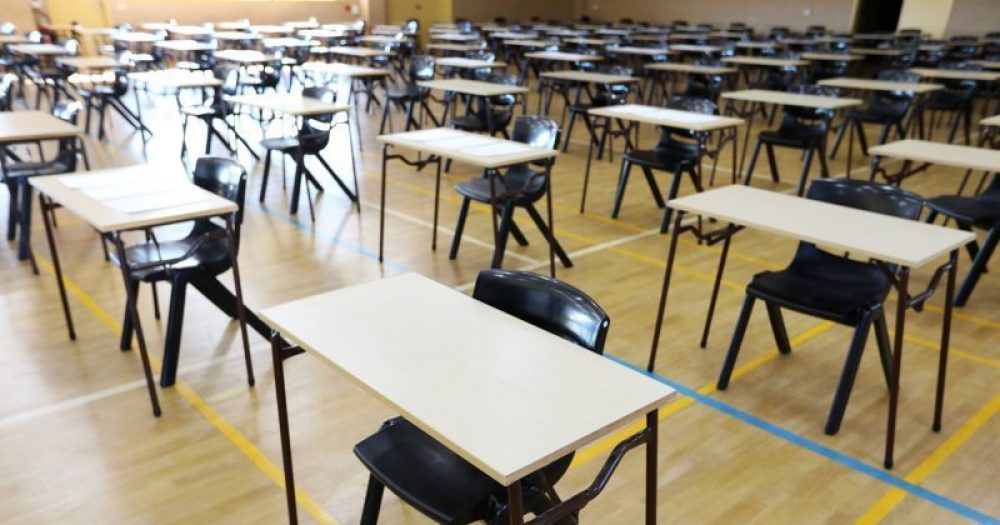Ministers have been told to stop “dithering” and give schools clarity on what will happen with exams next year, following the Scottish government’s decision to cancel some tests and push others back.
Gavin Williamson, the education secretary, has promised exams will take place and that full plans – including whether or not they will be delayed to allow more teaching time – will be set out later this month.
There is sadly little sign as yet that a serious plan B is on the table
Unions seemed none the wiser over what those plans may be, despite a meeting with Nick Gibb, the schools minister, and Dame Glenys Stacey, the interim chief of regulator Ofqual.
Meanwhile, John Swinney, Scotland’s education minister, said this week that National 5 exams would be replaced next year by teacher assessments and coursework and that Higher exams would take place later than usual.
The decision north of the border also follows the publication of an independent “rapid review” of national qualifications in 2020. The Scottish government has accepted almost all its recommendations, prompting criticism of the UK government’s reluctance to hold a similar inquiry.
Unions also believe that ministers’ resolve to hold exams in 2021 could prevent the creation of a proper “plan B” if schools are forced to partially close again.
“There is sadly little sign as yet that a serious plan B is on the table,” said Dr Mary Bousted, the joint general secretary of the National Education Union.
She said the announcement in Scotland “dispels the ridiculous myth propagated by the government in England that you cannot prepare a contingency for fear it may distract from plan A”. The DfE was “languishing in a state of denial about this year’s fiasco”.
Speaking earlier this year, Sally Collier, the former Ofqual chief, said schools needed to know about next year’s exams “before the summer break ideally”.
Bousted said: “Teachers, students and parents in England need to have a much clearer picture of what counts in examinations next year, and what form the assessment will take. This is not the time for dithering.”
She added that the UK government’s resistance to an independent review reflected a “failure to act matched with an inexcusable tardiness”.
The Sunday Times reported last week that the government’s plan B – should pupils be unable to sit tests – is to allow them to sit a single exam paper later in the year.
Ofqual has also mooted online tests as a potential alternative.
The newspaper also reported that plan C would be to use teachers’ predictions of pupils’ performance, but this would only come into effect if exams could not go ahead.
The Sunday Times said many schools had instructed teachers to prepare “invigilated mock exams” at the end of the year in case of disruption.
This follows concerns earlier this year about the validity of mock tests after the government announced they could form the basis of appeals against grades issued in 2020.
In a Teacher Tapp poll this week, 30 per cent of teachers said their school was planning mock exams with an external invigilator this term. Forty-seven per cent said their school was not; 18 per cent did not know.
Reaction to Scotland’s decision has been mixed.
Steve Chalke, the founder of the academy chain Oasis Community Learning, told the Today programme on Radio 4 yesterday that scrapping tests in England was “the only wise thing to do”.
“To go ahead is too big a risk … playing with young people’s lives.”
But the Parents and Teachers for Excellence campaign group has urged people to sign an open letter calling for exams to go ahead. Organised by Stuart Lock, chief executive of Advantage Schools, it states “all pupils must be given the opportunity to show their abilities regardless of their background, holding exams are the only fair way to do this”.
This can be done with flexible exam timing, more options on exam papers and with grade boundaries consistent with 2019 results, the letter adds.
Setting out their own proposals for next year, the five education unions said that some grade inflation should be allowed, but not as much as in 2020 with centre-assessed grades (CAGs).
They also suggested that staged assessments “along with other agreed evidence such as coursework” could be used to determine CAGs as a back-up for those unable to sit exams.
But the Association of School and College Leaders said it was “increasingly frustrated at the ongoing lack of clarity from the government over what it plans to do about these exams”.








Your thoughts